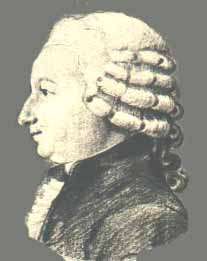Armand-Gaston Camus
Armand-Gaston Camus (2 April 1740 – 2 November 1804), French revolutionist, was a successful advocate before the French Revolution. He was the son of Pierre Camus, a lawyer in the Parlement of Paris.

French Revolution
In 1789 he was elected by the Third Estate of Paris to the Estates-General, and attracted attention by his speeches against social inequalities.[1] He was one of the National Assembly's earliest presidents (28 October – 11 November 1789), and he was the most prolific speaker: no one addressed the Assembly more times than did he (over 600 times); d'André is second at 497, le Chapelier third at 447. Camus was so frequently called upon to speak mostly because of his expertise in canon law.
Camus was appointed on 14 August 1789 archivist to the Commission des archives of the Assembly, a position that was the immediate precursor to the Archives Nationales.[2] He would retain these functions until his death. He helped to write and voted for the Civil Constitution of the Clergy, worked to end the practice of paying annates to the papacy, and promoted the annexation of the Vaucluse by France. On 30 July 1791, he obtained the abolition of titles of nobility.
Elected to the National Convention by the département of Haute-Loire,[1] he was on a mission during the judgment of Louis XVI, but he wrote 13 January 1793, that he voted "death without appeal and without reprieve". On his return, he was sent to Belgium as one of five commissioners of the Convention, to the Armée du Nord commanded by General C. F. Dumouriez. The general was in an extremely precarious position, and was suspected of plotting to betray the Revolution. The suspicions were confirmed when Dumouriez delivered Camus with his colleagues to the Austrians (3 April 1793).[2]
After thirty-three months of captivity, Camus was exchanged for Marie Thérèse of France in November 1795. He played an inconspicuous role in the Council of Five Hundred, refusing positions in the Ministry of Finance or of Police. He was restored to the office of archivist in 1796 and became absorbed in literary work. He remained an austere republican, refusing to take part in the Napoleonic régime.[1]
External links
- Online full text versions of pamphlets written by Armand-Gaston Camus from the Ball State University Digital Media Repository
References
-

- Chisholm 1911.